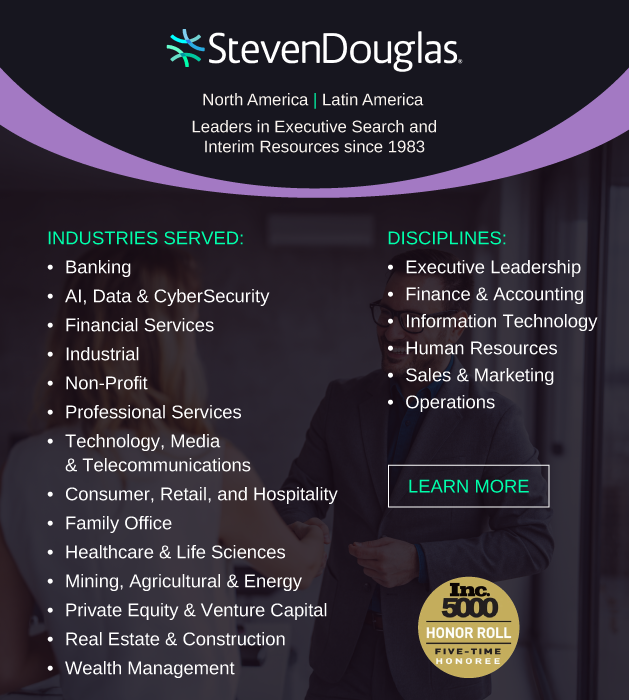As we hit the ground running in 2024, S&P’s latest analysis predicts a resurgent year in M&A. Hunt Scanlon Ventures’ managing director Drew Seaman unpacks what it all means for dealmaking in the human capital market for this year.
2023 brought a relatively sluggish year for M&A as macroeconomic conditions kept many key players on the sidelines. However, S&P’s latest analysis predicts that several factors may spur dealmakers into action in 2024.
The decline in deal announcements and total value, observed since 2022, has been attributed to the impact of a rising interest rate environment, leading to increased financing costs and decreased equity prices. While expectations suggest that interest rates will remain somewhat elevated, an end to the Federal Reserve’s hiking cycle will improve the M&A outlook.
Clarity in the debt markets will prove pivotal for private equity firms that utilize this type of leverage to get deals done. The surge in private equity funds contributed to record-high M&A levels in 2021, but concerns about rising interest rates and a potential recession dampened activity among these investors.
A Revitalizing IPO Market
As of the third quarter of 2023, the value of private equity and venture capital entries plummeted to $169.85 billion, marking a 57% year-over-year decrease and the lowest total for the first three quarters since at least 2019.
While this cautious approach from dealmakers led to a lackluster year in 2023, it also led to an astounding buildup of dry powder within PE firms. According to S&P, global private equity dry powder at midyear stood at a record $2.49 trillion, up more than 11% since the close of 2022. As debt markets become less volatile PE operators will be empowered to deploy that capital.
Less variability in the debt markets won’t be the only factor bringing PE firms off the sidelines in 2024. The slowdown in private equity dealmaking this past year was, in part, driven by a lack of exit opportunities that reduced distributions to limited partners and hindered fundraising. In the first half of 2023, private equity fundraising saw a 20.5% year-over-year decline, and new fund launches were expected to decrease even more.
However, there have been indications that a reopening of the IPO window may be just around the corner, offering hope for increased private equity exits. A revitalized IPO market is beneficial for M&A, enabling companies to explore dual-track processes, simultaneously considering IPOs and soliciting bids from buyers. A thriving IPO market would enhance fundraising prospects for private equity by providing an additional pathway to exit investments from portfolio companies.
Will PE firms truly come off the sidelines this time around? And how will this affect human dealmaking in human capital markets? Following are excerpts from a recent discussion with Drew Seaman, managing director of Hunt Scanlon Ventures.
Drew, what’s your biggest takeaway from S&P’s analysis?
I really appreciated the emphasis that S&P placed on PE firms coming off the sidelines this year. The indicators are all there to suggest an intense resurgence for dealmakers in the space and the people we speak with are eager to capitalize on this more engaging environment. Clarity in the debt markets coupled with an improved environment for exits begins to paint the picture, but in truth there’s more to it.
“As dealmakers become more active, the demand for strategic leadership, and specialized talent will increase.”
What else do you see?
Survey data that we recently published from EY reported that 69% of U.S. CEOs expect higher profitability in 2024. Clearly business leaders have an optimistic outlook for this year. This optimism was reflected months ago by Morgan Stanley data that we published last July, predicting a sharp rebound, with earnings-per-share growing by 23% in 2024 and 10% in 2025. When we combine all of this with the fact that EY survey data had 93% of CEOs stating that they’ll be pursuing either traditional M&A, a joint venture, or a divestment/spinoff/IPO in the next year, it’s really hard to see how PE firms will remain on the sidelines. In our view, it is now or never!
What would you say to skeptics who expect this past year’s environment to drag into 2024?
I can understand why some might look at past trends and expect to see the environment of last year dragging into this one. However, the indicators are all in place to suggest that Morgan Stanley’s new forecasting model of “hotter but shorter” cycles is now in play.
“The indicators are all in place to suggest that Morgan Stanley’s new forecasting model of “hotter but shorter” cycles is now in play.”
How will these trends impact human capital markets in 2024?
These trends will present a massive boost for human capital markets this year, and beyond. A rising tide lifts all boats, and when deals are being done, talent becomes not only a necessity but a priority. As dealmakers become more active, the demand for strategic leadership, and specialized talent will increase. As PE firms come off the sidelines and put their dry powder to use, they’ll cause a ripple effect in talent acquisition across various industries. We believe that will further drive investments in human capital providers. 2024 will bring a dynamic market into sharp focus with human capital playing a pivotal role in realizing growth objectives. This is an exciting prospect for professionals in our sector, those seeking career opportunities in a vibrant and expanding market, and search firm founders seeking transitions and exits.
Article By

Drew Seaman
Drew Seaman is a Managing Director at Hunt Scanlon Ventures. He is responsible for co-managing the firm’s investment portfolio of executive search, talent acquisition, private equity, and investment firms. In addition to sourcing new opportunities and managing the firm’s current investments, Drew leads the technical aspects of client engagements, including valuation and financial analysis and the preparation of investment marketing materials.
Drew began his career in wealth management before joining BMO Capital Markets as an Investment Banking Associate in the Financial Institutions Group. Drew assisted with transaction execution and prepared comprehensive valuation and financial analyses for clients in the specialty finance, asset and wealth management, and insurance sectors.
Drew earned a B.A. in Economics from DePauw University, where he was quarterback on the varsity football team. He earned his M.B.A. with concentrations in Finance and Accounting from NYU’s Stern School of Business. Connect with Drew.






